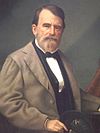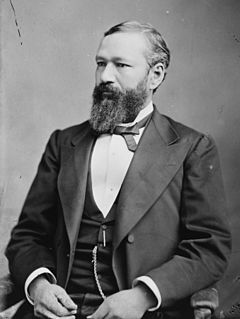
Pinckney Benton Stewart Pinchback was an American publisher and politician, a Union Army officer, and the first African American to become governor of a U.S. state. A Republican, Pinchback served as the 24th Governor of Louisiana from December 9, 1872, to January 13, 1873. He was one of the most prominent African-American officeholders during the Reconstruction Era.
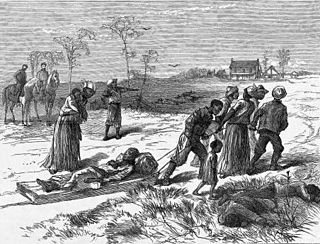
The Colfax massacre, or Colfax riot as the events are termed on the 1950 state historic marker, occurred on Easter Sunday, April 13, 1873, in Colfax, Louisiana, the seat of Grant Parish, when approximately 150 black men were murdered by white Southerners.

The White League, also known as the White Man's League, was a white paramilitary terrorist organization started in the Southern United States in 1874 to kick Republicans out of office and intimidate freedmen from voting and politically organizing. The group was affiliated with the Democratic Party. Its first chapter was formed in Grant Parish, Louisiana and neighboring parishes and was made up of many of the Confederate veterans who had participated in the Colfax massacre in April 1873. Chapters were soon founded in New Orleans and other areas of the state.
The Coushatta massacre (1874) was the result of an attack by the White League, a paramilitary organization composed of white Southern Democrats, on Republican officeholders and freedmen in Coushatta, the parish seat of Red River Parish, Louisiana. They assassinated six white Republicans and five to 20 freedmen who were witnesses.

John McEnery was a Louisiana Democratic politician and lawyer who was considered by Democrats to be the winner of the highly contested 1872 election for Governor of Louisiana. After extended controversy over election results, the Republican candidate William Pitt Kellogg was certified. McEnery, who had been an officer in the Confederate States Army during the American Civil War, was not allowed to take office following a weighing in by the federal government and local Republicans loyal to President Ulysses S. Grant.
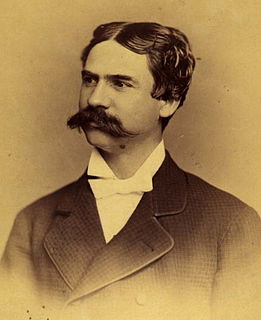
Henry Clay Warmoth was an American attorney, Civil War officer in the Union Army, who was elected governor and state representative of Louisiana. A Republican, he was 26 years old when elected as 23rd Governor of Louisiana, one of the youngest governors elected in United States history. He served during the early Reconstruction Era, from 1868 to 1872.

Stephen Bennett Packard, a native of Maine, emerged as an important Republican politician in Louisiana during the era of Reconstruction. He was the unsuccessful Republican gubernatorial nominee in 1876.

The Republican Party of Louisiana is the U.S. state of Louisiana's organization of the national Republican Party. The state chairman is Louis Gurvich, a businessman from New Orleans, who was elected on February 24, 2018. Since the late 20th century, white conservatives in the states have mostly shifted to the Republican Party from the Democratic Party. As of 2016, every statewide elected official in Louisiana, with the exception of the governor, is a Republican.

The Wheeler Compromise, sometimes known as the Wheeler Adjustment, was the settlement of the disputed gubernatorial election of 1872 in the US state of Louisiana, and negotiation to organize the state's legislature in January 1875. It was negotiated by, and named after, William A. Wheeler, Congressman from New York and a member of the US House Committee on Southern Affairs. He later was elected as Vice President of the United States.
The following table indicates the party of elected officials in the U.S. state of Louisiana:
The Day Freedom Died, subtitled "The Colfax Massacre, the Supreme Court, and the Betrayal of Reconstruction", published in 2008 is the first book by American journalist Charles Lane, and deals with the Colfax massacre of 1873 in Louisiana and its political repercussions during Reconstruction, including the resulting Supreme Court case, United States v. Cruikshank.

The Battle of Liberty Place, or Battle of Canal Street, was an attempted insurrection by the Crescent City White League against the Reconstruction Era Louisiana state government on September 14, 1874, in New Orleans, which was the capital of Louisiana at the time. Five thousand members of the White League, a paramilitary organization of the Democratic Party, made up largely of Confederate veterans, fought against the outnumbered New Orleans Metropolitan Police and state militia. The insurgents held the statehouse, armory, and downtown for three days, retreating before arrival of Federal troops that restored the elected government. No insurgents were charged in the action. This was the last major event of violence stemming from the disputed 1872 gubernatorial election, after which Democrat John McEnery and Republican William Pitt Kellogg both claimed victory.

Jean Maximilien Alcibiades Derneville DeBlanc was a lawyer and state legislator in Louisiana. He served as a colonel for the Confederate army during the American Civil War. Afterward, he founded the Knights of the White Camellia, a white insurgent militia that operated from 1867-69 to suppress freedmen's voting, disrupt Republican Party political organizing and try to regain political control of the state government in the 1868 election. A Congressional investigation overturned 1868 election results in Louisiana.

The Louisiana gubernatorial election of 1904 was held on April 19, 1904. Like most Southern states between Reconstruction and the civil rights era, Louisiana's Republican Party had virtually no electoral support. As Louisiana had not yet adopted party primaries, this meant that the Democratic Party convention nomination vote was the real contest over who would be governor. The election resulted in the election of Democrat Newton C. Blanchard as governor of Louisiana.

The Louisiana gubernatorial election, 1865, was the second election to take place under the Louisiana Constitution of 1864. As a result of this election James Madison Wells was re-elected Governor of Louisiana. The result was a lop-sided result for Wells because many whites, who supported the Democratic Party, remained disqualified due to their support of the Confederacy. Nonetheless Democrats nominated fugitive former Governor Henry Watkins Allen.

The Louisiana gubernatorial election, 1868, was the first election to take place under the Louisiana Constitution of 1868. As a result of this election Henry C. Warmoth was elected Governor of Louisiana. At age 26 he was the youngest governor in the state's history. The result was a lop-sided result for Warmoth because of the Republican Party's overwhelming support amongst the freedmen who were the voting majority in the state at the time.

The Louisiana gubernatorial election, 1876, was the third and final election to take place under the Louisiana Constitution of 1868. As a result of this election Francis T. Nicholls became Governor of Louisiana, but not before the election was contested by his opponent. The results of this election, like those of 1872 were disputed. The dispute was resolved by the Compromise of 1877 which gave the Governor's Mansion to Democrat Francis T. Nicholls. The Compromise also gave Republican presidential candidate Rutherford B. Hayes the electoral votes of several disputed states, including Louisiana, which resulted in his election to the White House. The election of Nicholls marked the end of Reconstruction in Louisiana and the decline of the Republican Party of Louisiana.
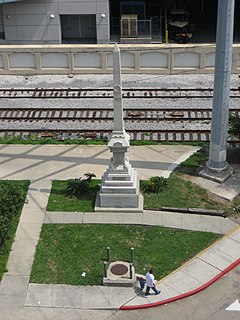
The Battle of Liberty Place Monument is a stone obelisk on an inscribed plinth, formerly on display in New Orleans, in the U.S. state of Louisiana, commemorating the "Battle of Liberty Place", an 1874 attempt by Democratic White League paramilitary organizations to take control of the government of Louisiana from its Reconstruction Era Republican leadership after a disputed gubernatorial election.





